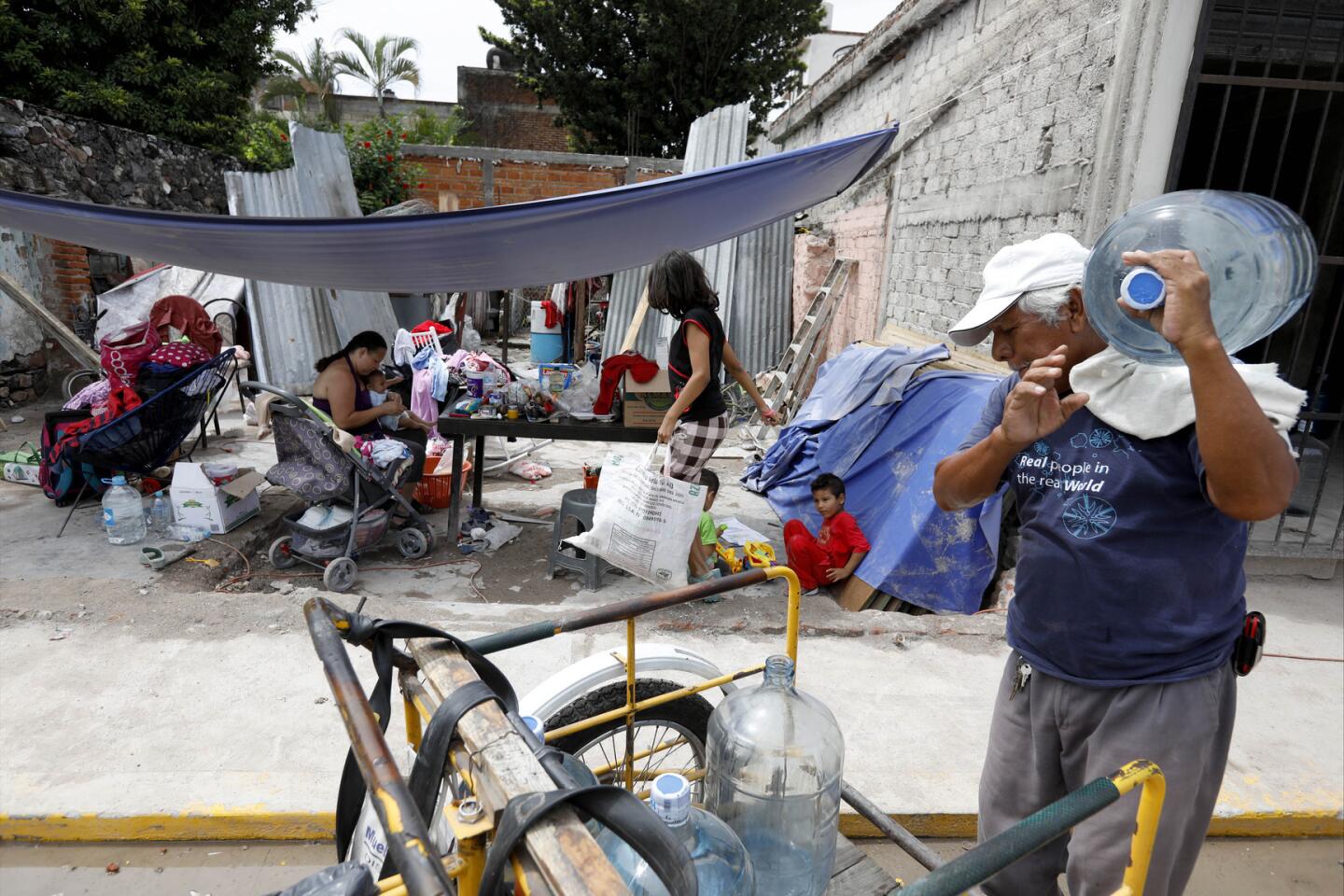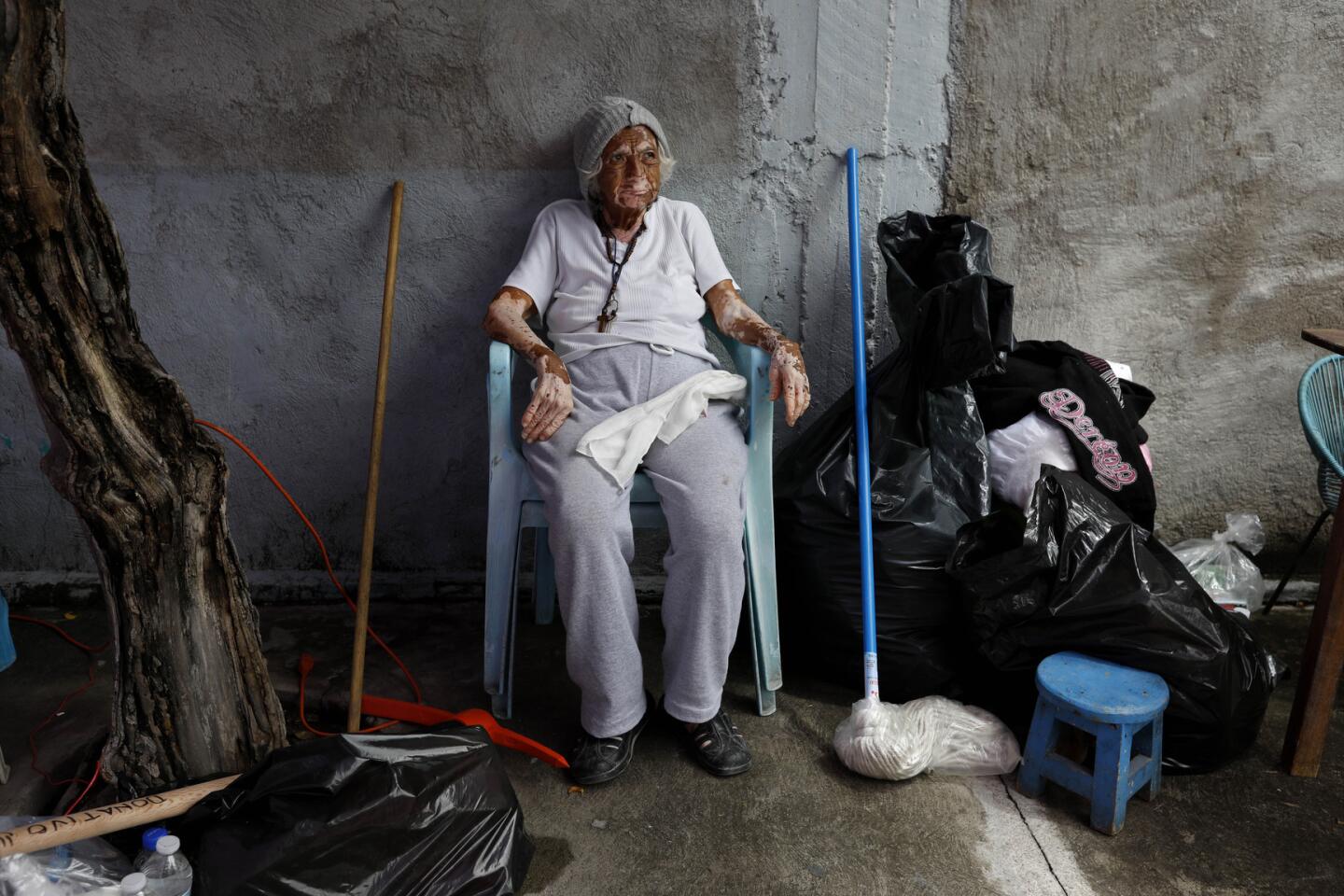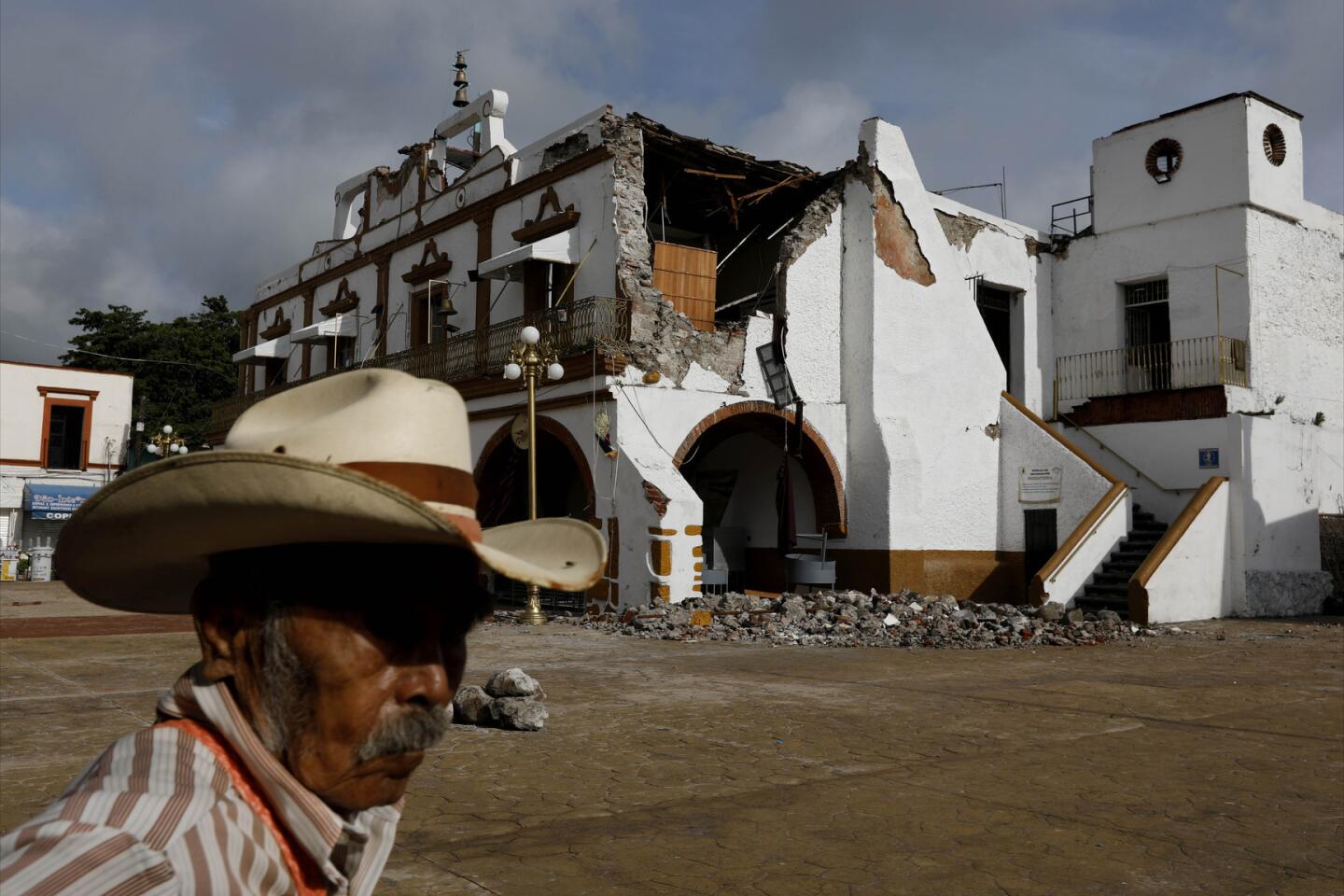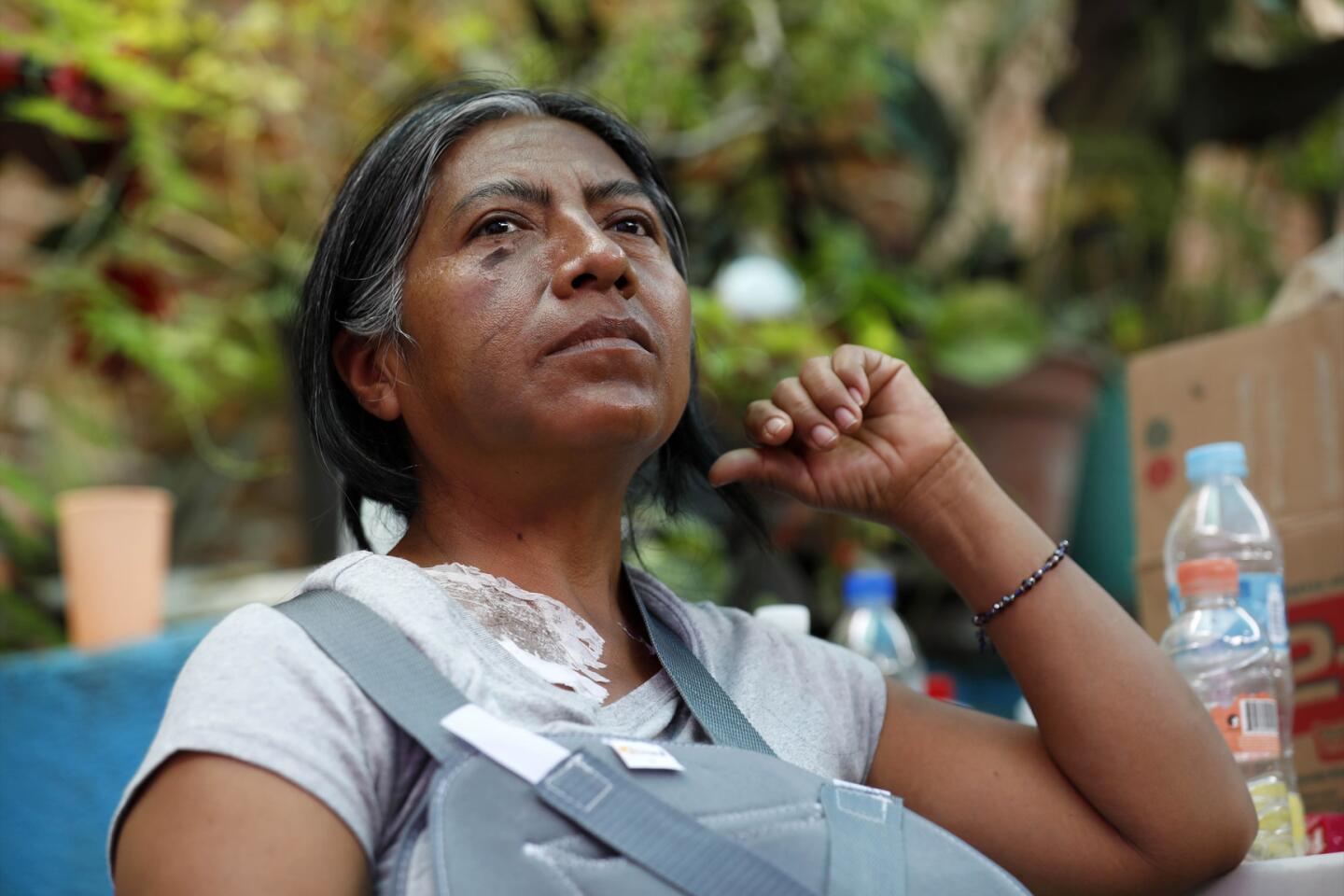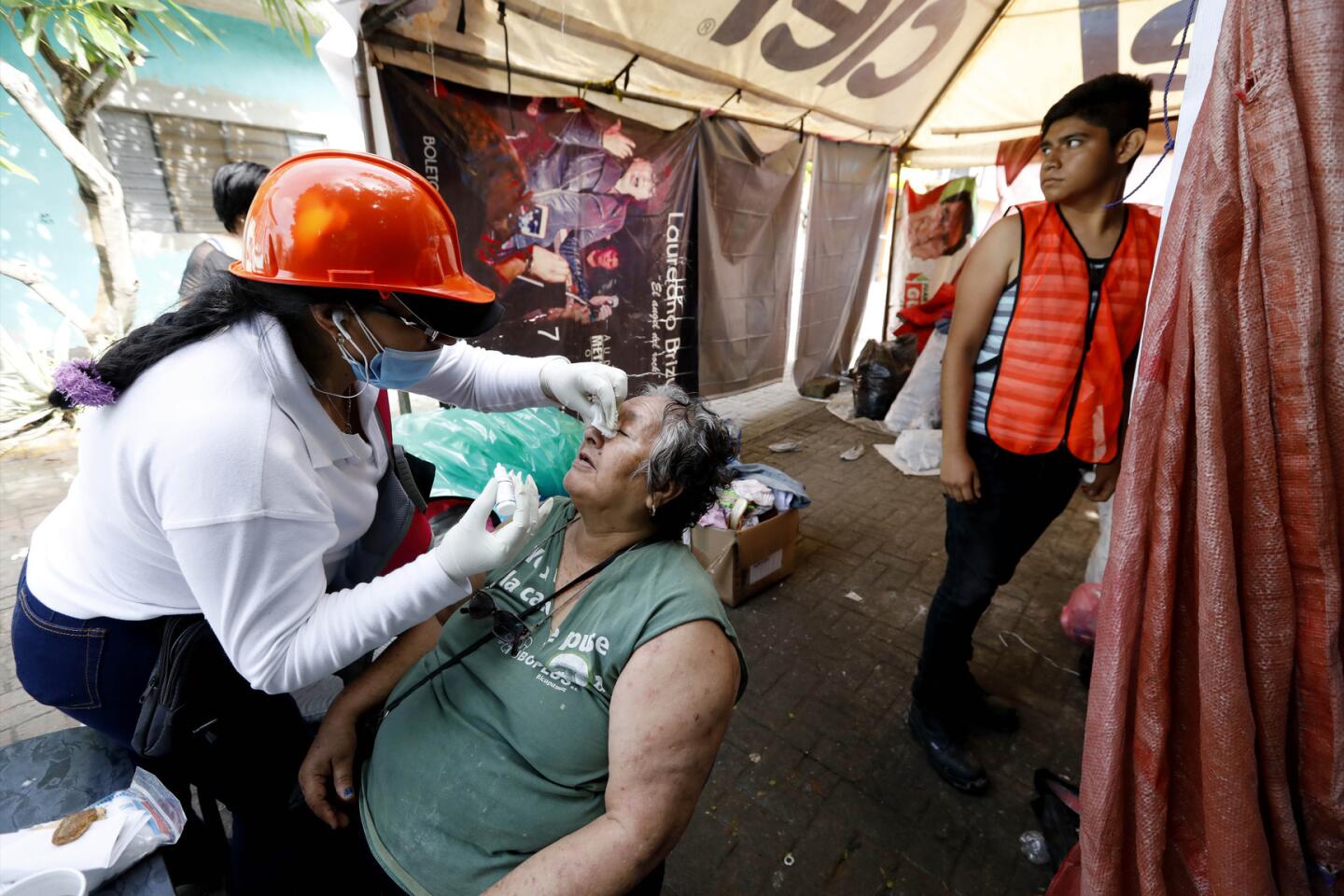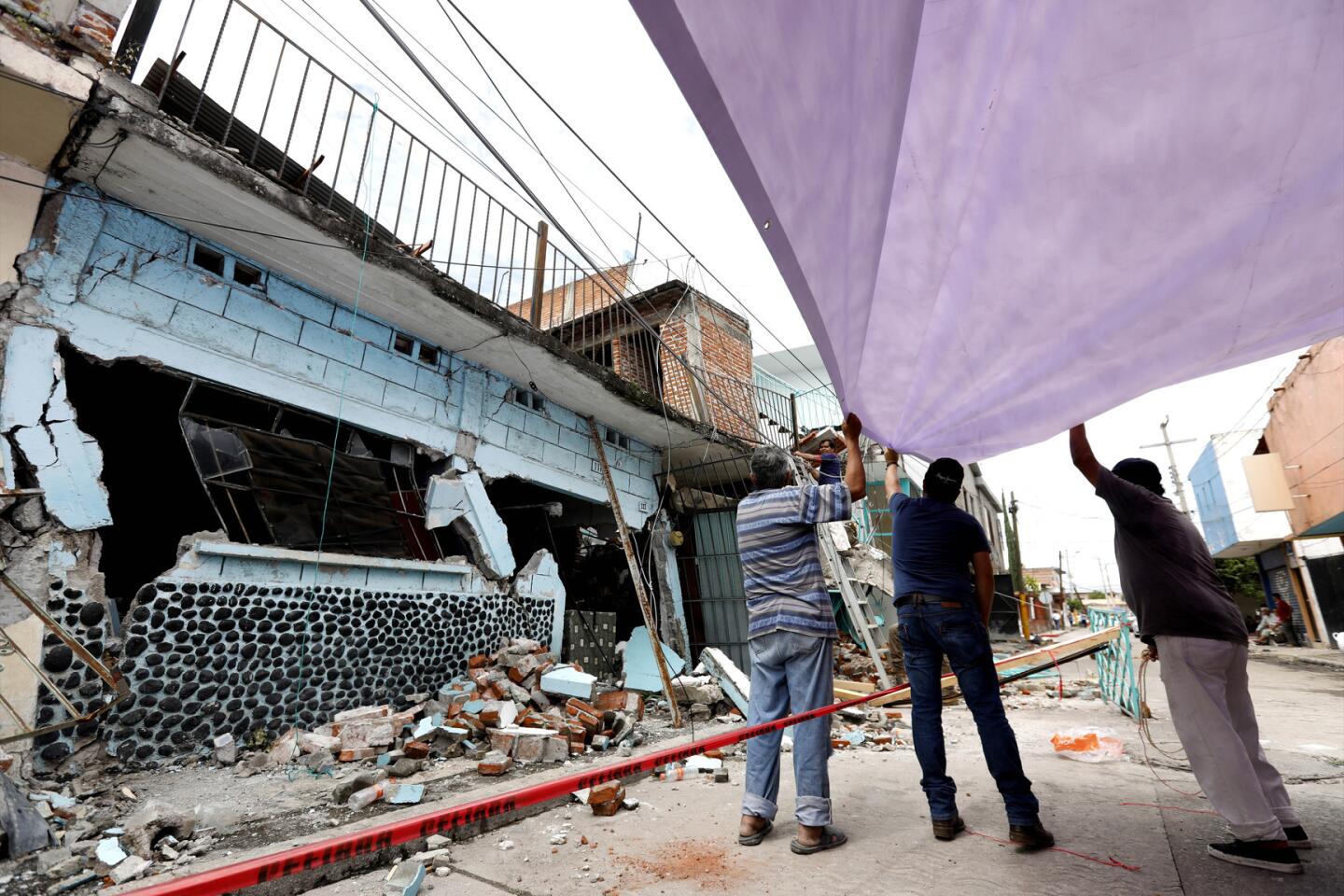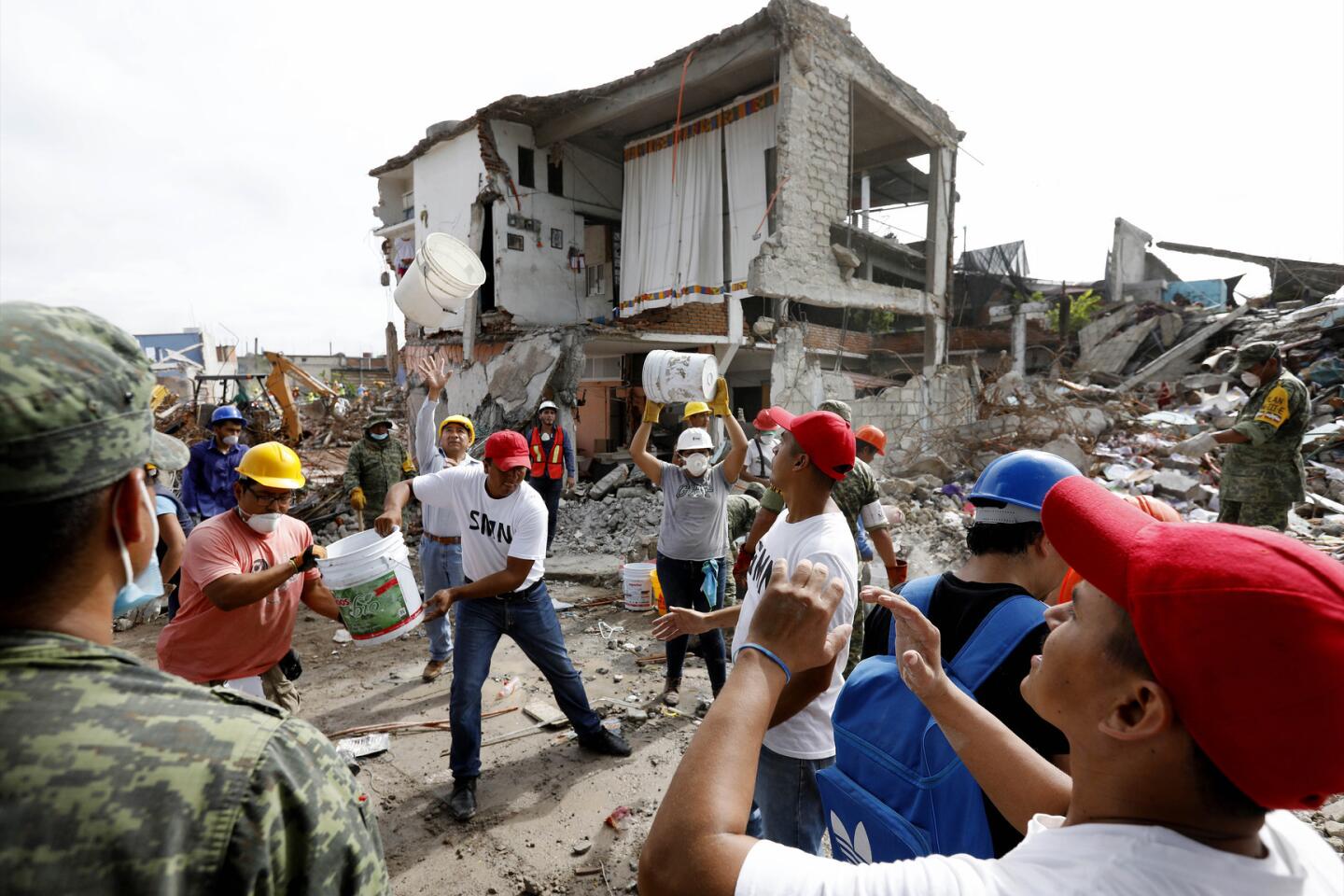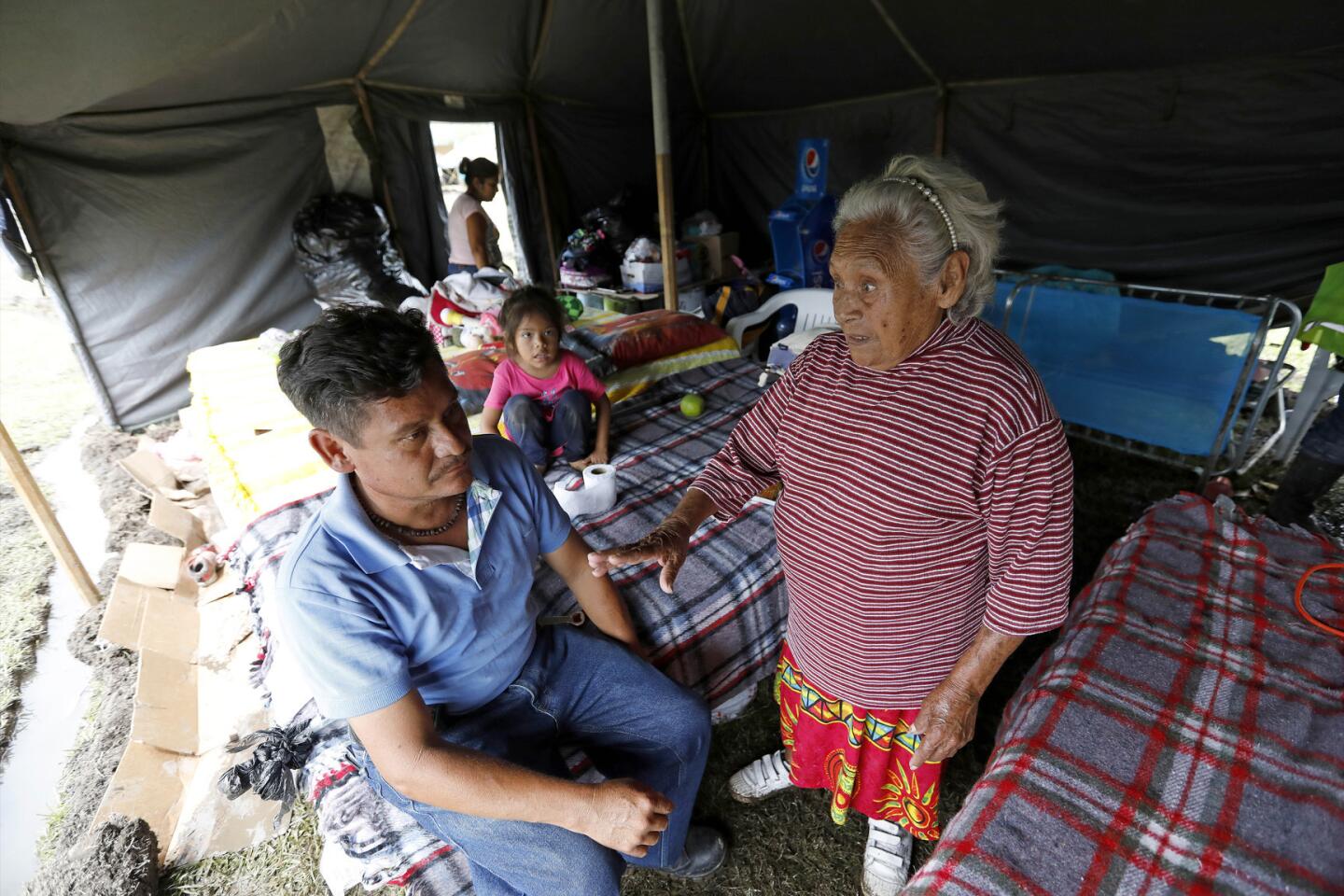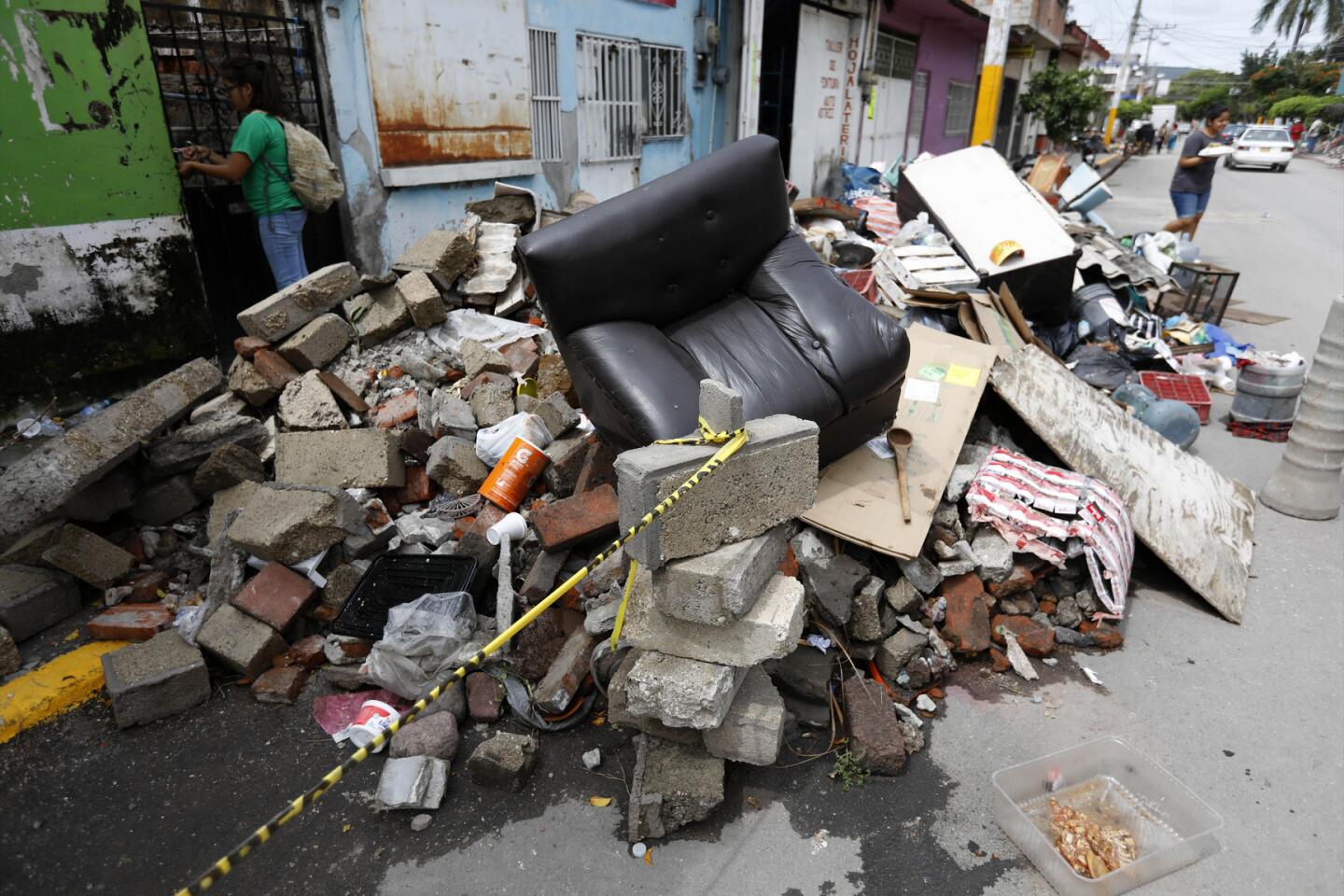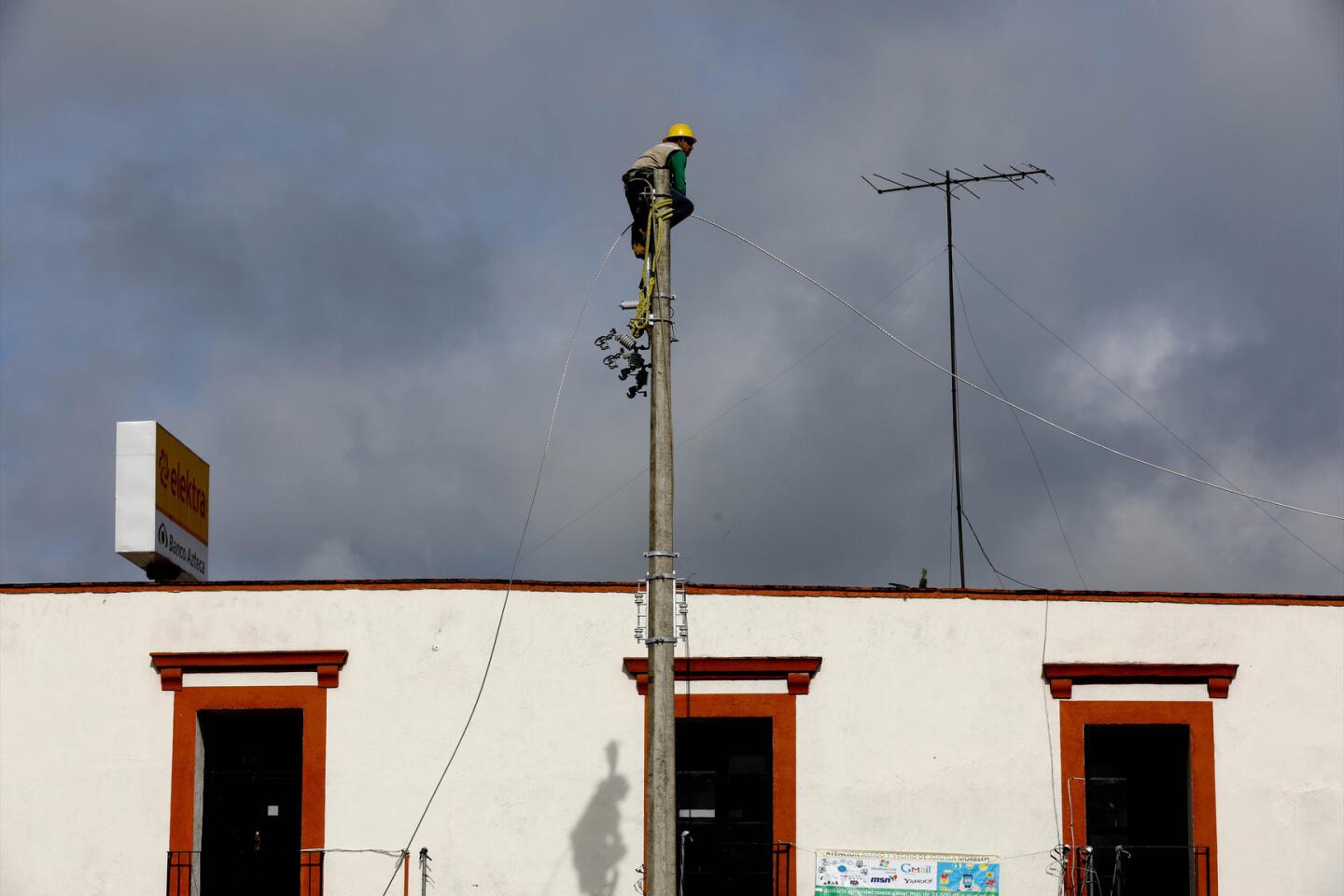In Jojutla, near epicenter of Mexico quake, scenes of heartbreak, loss and survival
- Share via
Reporting from Jojutla, Mexico — On a map roughly drawn on scraps of cardboard, the volunteers used bottle caps to mark the places they needed to search.
“There are many families asking us for help in these areas,” said one volunteer, tracing streets drawn in Sharpie with his finger. “But they’re really dangerous to get to.”
Nonetheless, the volunteers continued to plan. Such are efforts in Jojutla, an impoverished town south of Mexico City, where volunteers from in and outside the community are spearheading efforts to aid those traumatized and left destitute by this week’s powerful earthquake.
A group of about 200 people drove down from Mexico City on Thursday night, said organizer Elena Escandon. They weren’t needed in the capital but had heard they could be useful in Jojutla.
The volunteers set up a command center in a gazebo near the crumbled town hall, and Escandon organized them into groups. Some would clean rubble off streets, some would deliver food to affected neighborhoods and others would disperse medicine to aid centers.
There was no shortage of work, she said, and they could use more help.
Some of the worst devastation from Tuesday’s magnitude 7.1 earthquake was in Jojutla, a rural town of 57,000 residents in the state of Morelos. While aid has flooded the Mexican capital, residents here said government assistance was slow to arrive, despite a visit Wednesday by President Enrique Peña Nieto.
In Mexico City, officials blocked access to the dangerous areas. But all over Jojutla, old one- and two-story buildings, some made of adobe, looked ready to fall. Walking through the open streets, people paused to photograph the destruction: a pancaked two-story house, a shattered bodega with dusty soda bottles strewn across the floor, a red Volkswagen Jetta flattened under chunks of concrete.
The scene was in stark contrast to the capital, where volunteers packed the streets and some offers of food or aid were turned down because they weren’t needed.
But as volunteers set up in Jojutla, people lined up for hot meals, groceries and medical attention. Walking home with some necessities, Adela Gonzalez, 38, complained that the aid was stretched too thin. She took out a sandwich bag filled with a small amount of shampoo. Strapping a baby to her back, her sister said the three diapers she was given wouldn’t last long.
The women said the economy had taken a big hit with the earthquake. Their husbands were volunteering instead of working, and the only markets open sold food at high prices.
“Where is the government?” Gonzalez asked. “They only came for a photo op.”
Officials said the search for survivors here ended Thursday with 17 people dead. Three of the deaths occurred at the historic gold-trimmed town hall, now marred by a gaping hole and a collapsed bell tower.
Teams of engineers went out Friday to assess the damage and determine whether other structures, though still standing, would need to be demolished.
Among the emergency responders visible around town were police, military, firefighters and members of the civil defense agency. But many residents complained that more personnel were needed. Across town, people left signs on their homes asking the civil protection agency to inspect their dwellings.
After the earthquake, Isabel Martinez, 49, managed to get her furniture, refrigerator and some clothes out of her cracked but standing red house before authorities forbade her from reentering until they could assess the damage. Just outside her mother’s house, where she was staying for the time being, Martinez got into a heated conversation with neighbors.
“I know it’s painful and that you never in your life thought it would happen,” one man said.
“No, I didn’t,” Martinez said. “We don’t even have the government’s help.”
“It can’t happen from night to day,” said another man of relief efforts. “Help is arriving. Keep calm and wait.”
But Martinez, a preschool teacher, couldn’t wait. She was desperate to get back into her house to retrieve her photos and other mementos. Plus, she worried that more buildings would fall whenever she went outside. It was overwhelming.
Hundreds of people are sleeping in five shelters around town; the biggest has 350 people.
Others, like Jesus Quintero Salazar, 65, are sleeping in the toppled remains of their homes.
Salazar’s home, built 200 years ago out of adobe and passed down through generations of his family, was already damaged from age. The earthquake fractured the structure, which was divided into three apartments, where 12 members of his family lived. Its outer walls fell a day later.
The women and children of the family opted to sleep at neighbors’ homes. But the men stayed to protect what little they had left. Salazar works as a street vendor, selling dried fruits, avocados and other snacks. The yellow tricycle he uses to transport the food is now his most valuable possession.
“It’s sad,” he said, “to see that in just a little while, your life of almost 70 years has been ruined.”
Huddled under what remained of the tin roof in what used to be a garage, Salazar and his relatives got soaked by rain at night. But he was grateful that the losses were only material.
Still others, such as Laura Elena Quevedo Jimenez, 55, are sleeping on the street. Her home was one of six buildings in a row that were shaken from their foundations in Tuesday’s earthquake.
Jimenez slept under a tarp on a mattress in front of her neighbor’s house just across the street. Worried about robbers, she wanted to be present when authorities came to demolish the structure and save whatever she could. It had taken two days for authorities to put up caution tape and tell her she should not enter.
She tried not to focus on the loss of her childhood home, which leaned haphazardly against the house next door, its garage gates twisted. Chunks of a wall had toppled, exposing the interior. Her 82-year-old mother, who was home when the quake hit, escaped with only scrapes and bruises. That was blessing enough.
Less fortunate was Jimenez’s other neighbor, Leodegaria Comonfort Ramirez.
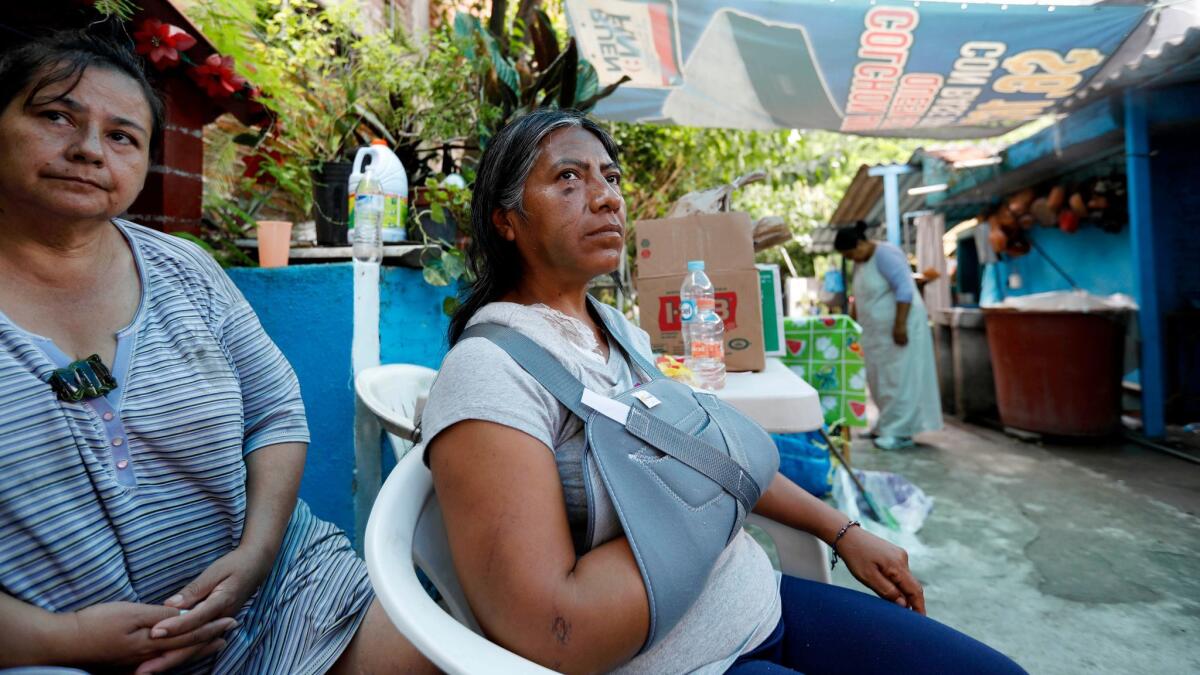
The earthquake brought the top floor of a duplex crashing onto Ramirez’s first-floor home. Standing at the doorway, her daughter, Dalia Aro Comonfor, 33, was killed instantly. Ramirez suffered a fractured shoulder.
“I will heal with time, but no one will bring my daughter back to life,” she said Friday, wincing as she touched her swollen arm that lay in a sling.
Unable to bring herself to leave the area, Ramirez, 49, slept at the neighbor’s house with Jimenez. The neighbors united around Ramirez, eating meals together and chatting to pass the time. They didn’t talk about their losses. Sitting across from the broken homes, it was useless to state the obvious.
“That’s how us Mexicans are,” Jimenez said. “Why be sad? Instead we can laugh. If we’re sad we’ll start crying, and who will be able to stop us?”
On the neighbor’s patio, Ramirez calmly recounted her daughter’s death. Comonfor had been staying with Ramirez every so often after the sudden death of her father three months ago. Comonfor had just arrived at her mother’s house with her husband and two young children.
Her 8-year-old son rushed into the kitchen right as the shaking started. Ramirez ran inside to get him. Comonfor ran after her mother, screaming for them both to get out.
Ramirez handed the child to Comonfor, who passed him at the doorway to her husband outside. Just then, the building’s main support beams snapped, slamming the second floor down onto her. Ramirez, who was deeper in the house, got buried in rubble but could see her daughter’s leg sticking out.
Help from authorities never arrived. It took neighbors an hour to dig Ramirez out. Afterward, they worked with Comonfor’s husband to remove his wife’s body, placing it on the sidewalk until it could be taken away.
ALSO
Mexico earthquake crumbles concrete buildings, sending deadly warning to California
On the Ground: In Mexico City, a sense of urgency and disquiet
For two and a half days, a saga of hope, grief and frustration at a toppled school in Mexico City
Mexicans aren’t counting on the government to rescue them. They’re saving themselves
More to Read
Sign up for Essential California
The most important California stories and recommendations in your inbox every morning.
You may occasionally receive promotional content from the Los Angeles Times.
